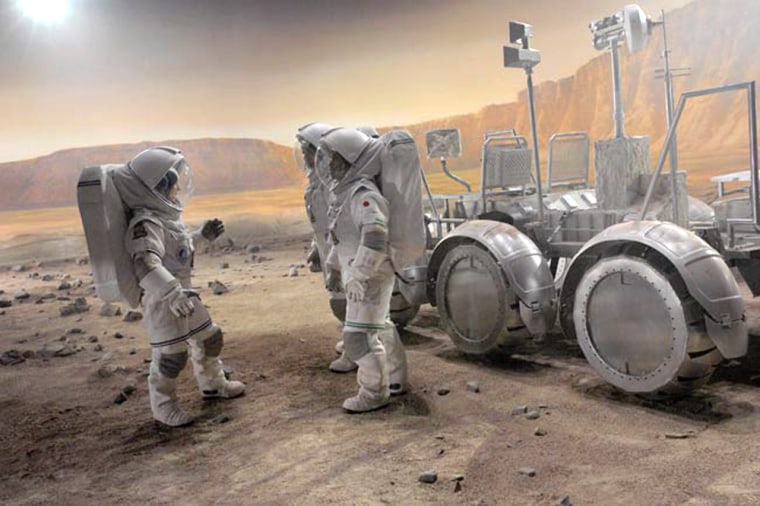Astronauts are stomping around Mars without ever leaving Earth in Canada, where filming is under way for an ambitious new documentary and a miniseries that blur the line between science fact and fiction.
Clad in spacesuits on sets awash in red dust, actors are portraying future astronauts in the television miniseries "Race to Mars," a Discovery Channel docu-drama aimed at realistically depicting a manned mission to the Red Planet. The three-hour program, as well as a six-part documentary titled "Mars Rising" and a related Internet site called "Mars Interactive," will make their debut in the fall of 2007 on the Discovery Channel and its broadcast partners.
Paul Lewis, president and general manager of Discovery Channel Canada, said the Mars program highlights what would be “the biggest and most exciting, most dangerous human scientific expedition that can be taken in the near term, perhaps in our lifetime.”
“This was a bit of a personal dream of mine to kind of take the mission to Mars,” Lewis told Space.com, adding that he had fond memories of NASA’sApollo moon missions during his childhood. “Hollywood’s taken a couple of stabs at it, but I didn’t think anybody has done the mission justice and done it in a way that would be truly scientifically authentic.”
Set in 2030
As expected, "Race to Mars" is set in the near future — 2030, to be exact — with China surging ahead of the United States and other nations in Mars exploration. China’s space ambitions apparently lead to a Red Planet race that prompts Canada, the United States, Russia, France and Japan to mount the first manned Mars mission.
Four men and two women — including a veteran cosmonaut, a French nuclear physicist and a Canadian astronaut who, not surprisingly, will play a key role in the mission — will launch toward Mars in the upcoming series, which will star actor Michael Riley ("Supervolcano," "This is Wonderland") as astronaut Capt. Rick Erwin, Discovery Channel officials said. Production is under way in Montreal and St-Hubert, Quebec, and will continue through mid-June.
The $18.1 million ($20 million Canadian) production — which covers "Race to Mars," an added one-hour faux-documentary retrospective by the flight’s “astronauts,” plus "Mars Rising" and the Web site — is being billed by Discovery Channel as the most expensive science television project under way in 2006, though program managers are hoping its realism and detail will prove worthwhile. More than two years were spent in preparation for filming, including meetings with Mars and spaceflight experts, Lewis said.
“One of the important goals, frankly, for us was to see if we could start to generate public interest, public excitement about human exploration of space again,” Lewis said. “It’s obviously something that really hasn’t fired people’s imaginations for a long time. … Our feeling is people are willing to be inspired again.”
A month of Mars
In Canada, the stand-alone "Mars Rising" documentary — which covers the challenges of an actual Mars flight — will air prior to the miniseries itself.
“It will kind of be like a month of Mars,” Jodi Bloom, manager of programming communications for the Discovery Channel, told Space.com.
In the United States, the documentary is slated to appear on The Science Channel, though plans for the miniseries are still developing, Lewis said.
"Race to Mars" stems from the pens of veteran science fiction writing team of Judith and Garfield Reeves-Stevens and Canada’s Galafilm, Inc. production house.
“Just as Capt. Rick Erwin assembled the ‘best of the best’ for his pioneering mission to Mars, so too have gathered the most comprehensive research, technologically accurate effects, strongest cast and most compelling writing team for this intensive 'Race to Mars' production,” Phyllis Platt, the film’s executive producer at Galafilm, said in a statement.
Mars stories on the rise
Documentary-style depictions of human space exploration seem to be on the rise. The BBC's "Space Race" — a fact-based version of the U.S.-Soviet moonshot rivalry — is set to debut in the United States' on the National Geographic Channel next month. That follows the British-made "Space Odyssey" (also known as "Voyage to the Planets and Beyond"), which chronicles the missions of an international group of astronauts as they explore Venus, Mars and the outer planets.
In the United States at least, those productions have a root in NASA’s Vision for Space Exploration, which aims at returning astronauts to the moon no later than 2020 and then pushing outwards to Mars and beyond.
China too — with its steady string ofhuman spaceflight successes and lofty space station and lunar plans — provides a real-life hook, in a time where human spaceflight seems to lack the emphatic and unified public support that pushed NASA to the moon during the Apollo era. Some members of Congress have even said the United States is already in a new space race with China, and already losing.
“I certainly do think that if the American public thought that the Chinese were going get to Mars first, there would be a huge groundswell of support for this kind of mission,” Lewis said, adding that in "Race to Mars," the rivalry offers a dramatic angle.
But still Mars, it seems, continues to beckon.
Two NASA rovers, Spirit and Opportunity, have surpassed all expectations as they continue to roll across the Martian surface, more than two Earth years since landing on the Red Planet. A new Martian satellite — NASA’sMars Reconnaissance Orbiter — arrived in orbit this year and is slowly honing its orbit into a circular path.
NASA also hopes to launch its Phoenix lander toward Mars in August 2007, while Europe and Canada plan missions of their own.
”If ["Race to Mars"] does in some small way get people thinking and talking about a mission to Mars, I think we would have done a really great thing,” Lewis said.
